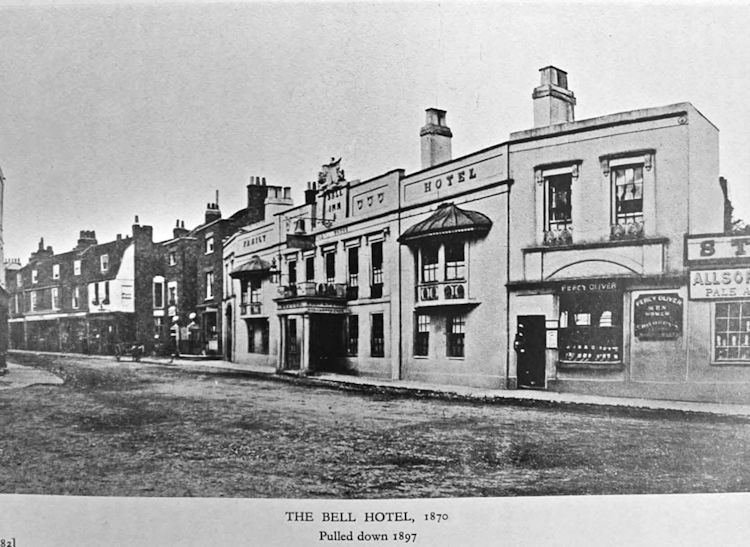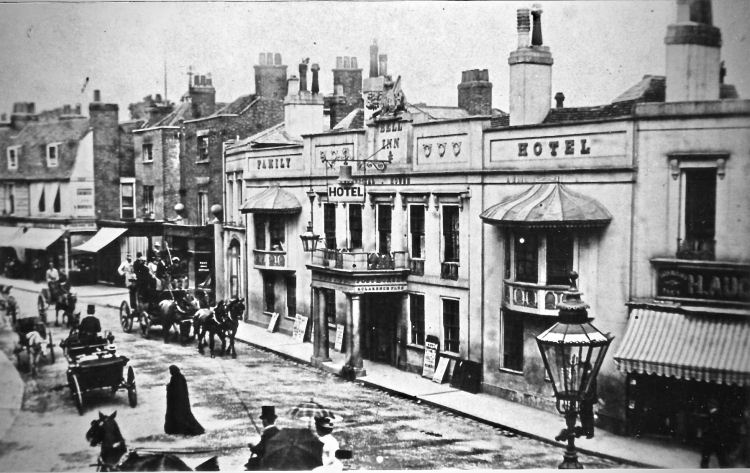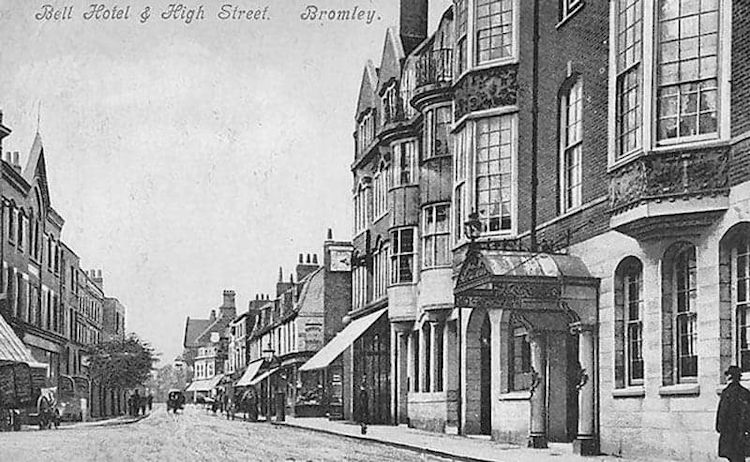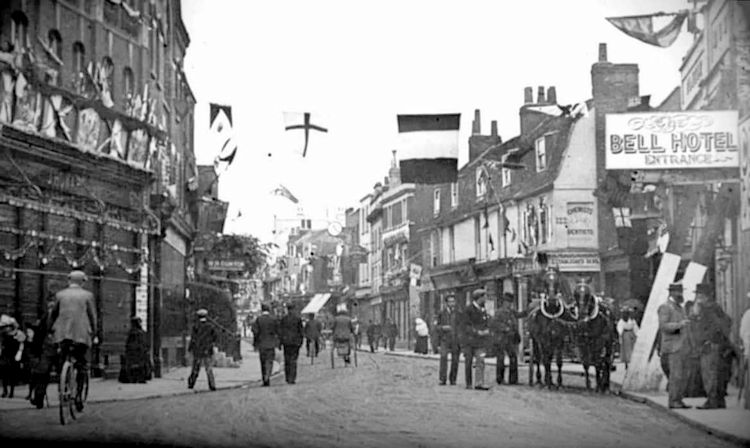|
High Street
Bromley

Above postcard, 1870. |

Above photo, circa 1890, kindly sent by Rory Kehoe. |

Above postcard, date unknown. |

Above photo, date unknown. |

Above photo, date unknown. |
The original "Bell Inn" posting house, was demolished in 1897, and can be
traced back to the 17th century when a parliamentary survey of the Manor was
planned there in 1646. At the end of the 18th century, two coaches ran daily
to and from London.
The "Bell" was granted the prefix 'Royal' after royal coaches began
changing horses there - on these occasions stable-hands put on scarlet
uniforms. In Jane Austen's 'Pride and Prejudice', Lady Catherine de Bourgh
recommends that Elizabeth changes horse at 'The Bell in Bromley'.
The Magistrates held their sittings there and the house was mainly
supported by the respectable Tradesmen of the town.
The "Royal Bell" forms part of a group of three buildings designed as a
whole. Hunters the Jewellers, 181 High Street, is the only shop in Bromley
to retain its original shop front. No. 179 was originally Martins Bank -
circular date motifs on two leaded bays still show 'M' and the date 1898.
According to the postcard of 1870, the original building was pulled down
in 1897.
|
From Jackson's Oxford Journal (Oxford, England), Saturday, April 15, 1820.
DIED.
Mrs. Wilmot, of the "Bell Inn," Bromley, Kent.
|
|
From the Borough of Greenwich Free Press, 18 October, 1856.
Coroner's Inquest.
An inquest was held at the "Bell Inn," Bromley, before J. C. Carttar,
Esq., coroner, to enquire into the death of Maty Dickson, widow,
aged 58.
John Austin deposed:— I am gardener to Coles Child, Esq. I was
taking a walk on Sunday evening last from Bromley to Bromley hill
and back; on returning, I passed by a woman who was violently
coughing. I had passed about 20 yards, when I heard her cry out for
help. I immediately returned. She said she felt very ill. On asking
her name she said it was Mrs. Dickson, and I live at Bromley, She
appeared unable to stand and was reaching violently. I rendered her
every assistance; others came up, whom I sent for assistance, but
before assistance came she was dead. From the first time I heard her
complain until assistance arrived, was about half an hour.
Other witnesses confirmed the above statement, and the jury returned
the following verdict, "Died from Natural Causes."
|
|
From the Bromley Record, February, 1860.
An Unexpected Visitor.
On Tuesday, the 19th alt., a bullock walked in at the front door of the "Bell
Hotel," made his way along the passage to the bar-parlour, where the family and
some lady visitors were at breakfast. After stopping to have a good look at
them, the unwelcome visitor walked into the front parlour, took a general survey
of the place, walked leisurely round the table two or three times, and then as
deliberately walked out, without doing any further mischief than frightening the
family and their friends.
|
|
South Eastern Gazette,10 January, 1860.
BROMLEY.
At the Petty Sessions, held at the "Bell Inn," on Monday, before
Lord Sydney and five other magistrates, the following licenses were
transferred:—
The "White Hart," Orpington, from Thomas Hayward to James Bruce.
The "Five Bells," Chelsfield, from Mrs. Sarah Jones to James Saker.
The "Guy, Earl of Warwick," Welling, from Henry Bartlett to W. K. Tritton.
There was no police business.
|
|
Oor's Kentish Journal, 14 January, 1860.
BROMLEY.
At the Petty Sessions, held at the "Bell Inn," on Monday, before Lord
Sydney and five other magistrates, the following licenses were
transferred:—
The "White Hart," Orpington, from Thomas Hayward to James Bruce.
The "Five Bells," Chelsfield, from Mrs. Sarah Jones to James Saker.
The "Guy, Earl of Warwick," Welling, from Henry Bartlett to W. K. Tritton.
There was no police business.
|
|
South Eastern Gazette, 16 October, 1860.
BROMLEY. County Court.
The monthly sitting of this court was held on Tuesday Inst, before
James 'Espinnase, Esq., Judge. The list continued 38 causes.
Sutton v. Engleheart.
Mr. Gibson appeared for the plaintiff, the proprietor of the "Bell
Hotel," Bromley. The amount sought to be recovered from the
defendant, who is a surgeon, was £30 15s. 6d. for the board and
lodging of himself and family for five weeks.
An order was made for the immediate payment of the amount, loan 9s.
charged for spirits.
|
|
From the Daily News, 10 September 1881.
Shocking Neglect of a Child.
Mr. Carttar, Kent Coroner, held an inquest at the "Bell Hotel,
Bromley, Kent, on the body of Albert Crowhurst, aged a year and
eleven months. The evidence showed that the mother, Kate Crowhurst,
a domestic servant, about three months ago placed deceased in the
charge of Mrs. Wilby, of Cooper's year, Bromley, who recently went
to the "Foresters' Fete at the Crystal Palace, leaving deceased in
charge of her son, aged 13. Whilst the boy was upstairs he heard a
fall, and on going down found deceased lying in the middle of the
floor. He picked the baby up, and called Mrs. Huggett, a neighbour,
who bathed the child's forehead, and sent for a doctor, but the
child died before his arrival.
Dr. H. J. Llott, of Bromley, who had made a post mortem examination
of the body, said he found it much emaciated, and weighing only
14lb. - the weight of a child of that age ought to be 20lbs. There
were several bruises on the face, scratches and abrasions on the
body, and a sore on the left leg. All the organs were healthy,
except the brain and lungs which were congested. The cause of death
was apoplexy, accelerated by want of proper food and care. On
visiting the house he found the surroundings very unhealthy. Several
witnesses were called who proved the child was in good health and
plump condition before Mrs. Wilby took charge of him, and the just
returned a verdict of manslaughter against Sophie Wilby, the coroner
making out his warrant of committal, but accepting two sureties of
£10 each, and the bail of the husband of Mrs. Wilby in £20, for her
appearance to take her trial at the next Maidstone Assizes.
|
|
From the
http://downeopc.blogspot.com accessed 3 June 2019.
The Old Bell Inn Bromley.
The parish registers contain some clues and other records are associated
with the Inn.
In the burial register for 1652 there are two mentions of the burials of
the Gyles brothers, sons of Daniell Gyles of "the belle".
We later have records of the Wilson family who from 1773 until 1822 were
Master of the posting house. James Wilson and then his widow and family
all acted as landlords; during this time the Beefsteak Club was formed in
Bromley and many notable gentry characters united in a love of sport met
there.
The Wilsons were succeeded from 1823 to 1845 by James Painter Davis and
his daughter. Davis was an enthusiastic cricketer. His daughter Mary Ann
Davis took over when he moved to Farningham until 1845 when she left.
Horsburgh describes her leaving to fulfil an appointment as housekeeper
to the Lord Mayor of London at the Mansion House but there appears to be
no documentary evidence to support Horsburgh's account. From 1846 until
it's demolition and rebuilding in 1897 it was run by William Sutton and
his family. The neighbouring bakers shop in Market Square was also
demolished and the site was incorporated in the rebuilding of the Royal
Bell Hotel that we see today.
Before the coming of the railway to the town Bromley was something of a
rural market town some 12 miles from London. It is often described as
such but it had a constant passage of horse drawn traffic between
London, Tunbridge Wells and Hastings.
The Bell and another Bromley Inn, the "White Hart" grew to serve this
traffic and the local population. The stage coach service between London
and Tunbridge Wells and onward to Hastings had need of a staging point
in the town and the Bell and "White Hart" could stable up to 100 horses
for travellers.
Two coaches a day left Bromley at 9 a.m. in the summer or 7:30 a.m. in
winter. One coach travelled to the Boars Head Fleet Street the other for
the Spread Eagle, Gracechurch Street. Over time additional stage coaches
added to the service with two to Charing Cross and an additional coach
to Gracechurch Street until the railway arrived in the town.
In addition there were two local daily carrier carts to London and these
are recorded as late as 1884. Consequently the Bell found fame and Jane
Austen in Pride and Prejudice has Lady Catherine de Bourgh recommend to
Elizabeth that she change horses at the Bell.
There are also references to death's of those accommodated at the Bell
overnight in the parish register and adjacent to the Market Square. It
was also popular for travellers at market days and the ancient Fair
days. Bromley although rural has a surviving 1801 census with a total
population of 2,700 (including schools and Bromley College which housed
widows and families of deceased clergy). Bromley's population of
permanent residents hardly increased over decades.
Bromley has for centuries been a place for Romany and other travelling
families and the parish registers record substantial burials of
traveller families who were a feature of Bromley Common and seasonal
fruit pickers and agricultural workers can be found to move through and
work the land.
One cause for increase in population was the attraction of permanent
residence to be under the care and supervision of Mister James Scott who
until retirement in 1829 to Clay Hill had become renowned as a surgeon
specialising in diseased joints and ulcerated hips. He had succeeded
Mister Bagshaw in his medical practice in Bromley. Thus the town
attracted patients and residents and there is a notable decline in
population after his retirement. "Scotts Coaches" brought patients from
all over the country to the practice.
The Bell became "Royal" when royal coaches began to change horses there
and in this respect it came to attract a different clientele to it's
companion the "White Hart".
Bromley had resident ostlers and stage coach men and traffic between
nearby "Croyden" and between Bromley Bishop's Palace and Rochester was
also undertaken. The initial passenger bus services between the town and
outlying villages and parishes like Keston, Downe and Cudham were horse
drawn and necessary to connect to the rail services which developed
after the 1850's when the town rapidly expanded to occupy the land to
the south and east along Bromley Common and north to created the need
for a branch railway line to Bromley North.
Copyright (c) Henry Mantell 2013.
|
LICENSEE LIST
WILSON James 1773-1822
WILMOT/WILSON Mrs dec'd to Apr/1820
DAVIS James Painter 1823-41+ (age 50 in 1841 ) )

DAVIS Mary Ann to 1845
SUTTON William 1847-97 (age 37 in 1851 ) )
New build.
SHIPP H J 1918+
FREEMAN M W 1930+
BEATON A L Mrs 1938+
https://pubwiki.co.uk/Bell.shtml
 From the Pigot's Directory 1832-33-34 From the Pigot's Directory 1832-33-34
 Census Census
|




